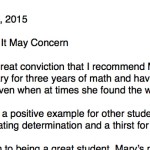Many Colleges request two Letters of Recommendation (LOR) from Teachers who have recently taught you an Academic Core Subject (English, Foreign Language, Math, Science or Social Studies).
The Teachers you choose will write one letter each that goes to all of the Colleges you apply to, often via The Common Application.

What makes you stand out from the crowd?
An easy way to estimate how highly a College considers those LOR is to check Collegedata.com. Type in the name of a school, choose the Admission tab and scroll down to Selection of Students. Many Factors that can impact admission are listed, including Recommendations. Factors are categorized as either Very Important, Important, Considered or Not Considered. Generally speaking, selective schools will heavily weight the LOR – they are overwhelmed by applicants with amazing academic qualifications, so hearing from your Teacher what makes you remarkable can make a big impact (and an underwhelming LOR also makes a big impact).
Even if your College of choice lists LOR as Considered, it is a smart practice to procure the best possible LOR, because a) you never know what might put you over the edge from rejected to accepted, or b) it may put you in the running for a Scholarship and c) LOR are one of the few opportunities for someone besides yourself to write about what makes you special (see Establish a Relationship With Your Counselor for the other opportunity). When Admissions Officers are reviewing hundreds if not thousands of files for many students with good grades, test scores and extracurricular activities, your essays and LOR are your opportunity to stand out from the crowd. If you don’t have good grades, test scores and extracurricular activities, the LOR can help to explain why – Mary is a diligent student who applies herself despite working many hours after school to help pay her family’s medical bills, for example.
Tips for LOR

If you apply ED or EA, your LORs will probably be due by 11/1
1. If you are applying to any Colleges Early Decision or Early Action, those letters will be due approximately 11/1. Some Colleges also require an earlier application date (maybe 12/1) in order to be considered for Scholarships. That means if you ask a teacher from your senior year to write that LOR, they will only have gotten to know you for 2-3 months, unless they also taught you in prior years. You better make a big early impression, or ask a Teacher from your Junior year to write your LOR. If you are reading this after your Junior year, you may be thinking uh oh, if you can’t think of 2 core subject Teachers from your Junior year who would be willing to write highly of you. Time to quickly make impressions on your Senior Teachers! See Establish a Relationship With Your Teachers for advice.

Do some of your Teachers have a reputation for writing great LOR?
2. Talk to older students to see if they have learned anything about which Teachers write good LOR – often times students don’t really know, because the letters are submitted directly by the teacher onto the Common Application, with no copy going to the student. STORY: An excellent student who was interested in writing asked their disorganized English Teacher to write them a LOR; they were worried about the outcome, but they felt it was important to have an English Teacher’s LOR, because they were indicating on their application that they wanted to be an English major. The Teacher submitted the LOR and then apologized, admitting they waited until the last minute and didn’t do a very good job.
3. Ask Teachers who you think write well and will praise you highly. Enough said.
4. Your Teachers are being inundated with requests to write LOR. The longer you wait to ask them, the more frustrated/stressed the Teacher, which may not be good for your LOR. Give your Teachers as much notice as possible that you would like them to write you a LOR. If you plan to ask a Teacher from your Junior year, give them a heads up the end of your Junior year. If they want to wait until the next academic year to write your LOR, remind them immediately in the fall. Likewise, if you are asking your Senior Teachers, let them know as early into the year as possible.

What qualities do you want to emphasize to prospective Colleges?
4. Make it easier for your Teacher to write a LOR and use this opportunity to highlight traits you think would impress the Colleges you are applying to, by creating a resume tailored to that Teacher. Teachers usually want to help you get into your dream College, so you need to help them help you. Specify in the beginning of your resume what traits or qualities you would like them to highlight in their LOR. What makes you an outstanding student? The resume you hand your Science Teacher may indicate that you want to highlight your ingenuity and ability to solve problems in unusal ways. The resume you hand your Language Teacher may indicate you want to highlight your willingness to spend time outside of class organizing activities for your French class that resulted in a more cohesive experience. Remember that these LOR will go to ALL prospective Colleges, so you want the message to be valuable for all of the Colleges you are considering. These resumes are EXTREMELY important, so it’s important to spend time thinking about what you want to include in them. See Resume for more advice.
5. Your LOR resume should only briefly cover your accomplishments that are already listed on your academic record. It might be important for the letter-writer to know that you have taken 5 AP classes, but they don’t need to know which classes, so they can list them in the letter – your transcript will tell the College Admissions Officer those details, don’t waste that valuable space. But if you have taken 4 AP Science classes, for example, that is an important item to point out in your resume. Likewise, the Teacher writing your LOR should have access to your High School Academic Record, so they don’t need a list of classes you took and grades you received.
6. You might choose to ask a Teacher from a subject in which you have not necessarily excelled, if you have been diligent. You might choose to ask your math Teacher to write you a LOR, because even though math is your weakest subject, that Teacher has recognized how you have persevered despite difficulties.

Handwritten thank you notes are the best. Make an effort at your verbiage.
7. Send a hand-written thank you note to anyone who writes you a LOR, preferably along with a small gift. Starbucks gift card? Homemade cookies? During those long class hours, you’ve probably picked up a lot about a Teacher’s personal life. They will appreciate that you gave them homemade cookies, because they LOVE homemade cookies, but never get them.
Do not underestimate the importance of Letters of Recommendation. How well you handle this process has direct impact on your eligibility.
Does your High School have their own nuances to the LOR process? Better ask your Upperclassmen – time to acquire information via Word of Mouth!
|
© Complete Systems, LLC dba Elligiblecollegestudent.com, All Rights Reserved
*** Elligiblecollegestudent.com is a division of Complete Systems, LLC ***
Disclaimer













